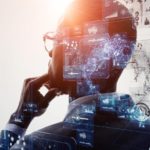 The emergence of generative AI has sparked fresh concerns about the future of work, with many rehashing worries about vast swathes of the workforce being automated. Research from the University of Southern California suggests it’s not that simple and that the best application of AI in the workplace will see man and machine working together.
The emergence of generative AI has sparked fresh concerns about the future of work, with many rehashing worries about vast swathes of the workforce being automated. Research from the University of Southern California suggests it’s not that simple and that the best application of AI in the workplace will see man and machine working together.
“The ‘human touch’ makes the difference in itself,” the authors explain. “If [the human touch] works alone, it’s going to be less effective than when it is coupled with this highly valid content provided by AI. Both are indispensable.”
The age of automation
It’s a perspective shared in a recent paper from ESCP Business School, which explores the likely relationship between human intelligence and machine intelligence as our workplaces become more automated.
For instance, there is a risk that if we give over too many of our capabilities to machines, it dulls our own capabilities for when we need to check their work or regain control. On the other hand, we can also develop more efficient practices from AI that allow us to focus on more important things.
The paper describes three levels of work that humans can perform in the workplace: intelligent hand (physical work), intelligent mind (cognitive work), and intelligent heart (emotional work).
The author argues that organizations have a critical role to play in developing policies that can mitigate potential losses of human capabilities to AI while also exploiting new technologies to create a better working experience for humans.
Supportive capabilities
While much has been made about the capabilities of generative AI, the immediate future is likely to be one of man and machine continuing to work together. The author explains that while technology can perform tasks with speed, precision, and strength, humans still contribute fantasy, intuition, and affection to the task.
As a result, they believe that jobs will not be eliminated entirely by machines, but will nonetheless be deeply impacted and modified by AI applications. The paper aims to reflect on this impact by focusing on how human capabilities can continue to develop in an era of increasing automation and digitalization.
The introduction of AI-based technologies is not without risks, however, not least in terms of weakening some human abilities, like memory, attention, accuracy, and manual precision. The author believes that we need to understand human intelligence in order to protect it.
Inside human intelligence
They argue that human intelligence can be structured in three levels. The first is intelligent hand – some manual skills cannot be replaced by machines with the same versatility and quality, seen in crafts where experts are most effective. The second level involves problem-solving, creativity, and social skills that are challenging to automate and create value. The third level is system-level perspective and wisdom that emerges from experience and helps organizations and society progress in a sustainable way over time.
To successfully capitalize on both man and machine will require a change in how organizations behave. The author argues that they need to create environments where people can truly be themselves and tap into what makes them human rather than ape the machines.
“It is necessary to acquire a higher awareness of human capabilities and personal talents,” the author explains. “Organizations need to create environments in which people can express themselves, make mistakes, restart, create, and innovate, and not just execute tasks or process information (like robots).”
Changes in how we learn
Similarly, our schools and educational establishments will need to do a much better job of helping us to develop the skills we need to work effectively alongside new technologies, with this being an ongoing process we engage in throughout our lives.
“Educational institutions play a crucial role in developing them. Instead of focusing on knowledge transfer, academic curricula need to be devoted to developing skills and attitudes that allow graduates to adapt to a dynamic work environment,” the author explains. “As said, jobs won’t be stolen by AI, but they will be profoundly transformed by it. Re-skilling of employees and life-long learning will become core activities of the higher education system.”
The paper highlights that while things like fly-by-wire have become essential tools on planes, we don’t want pilots to forget how to fly manually. The same is true in a wide range of work environments. It’s vital that we manage the development of AI in such a way that we don’t end up deskilling ourselves, as the best results are achieved when our skills develop alongside those of the technologies we deploy.